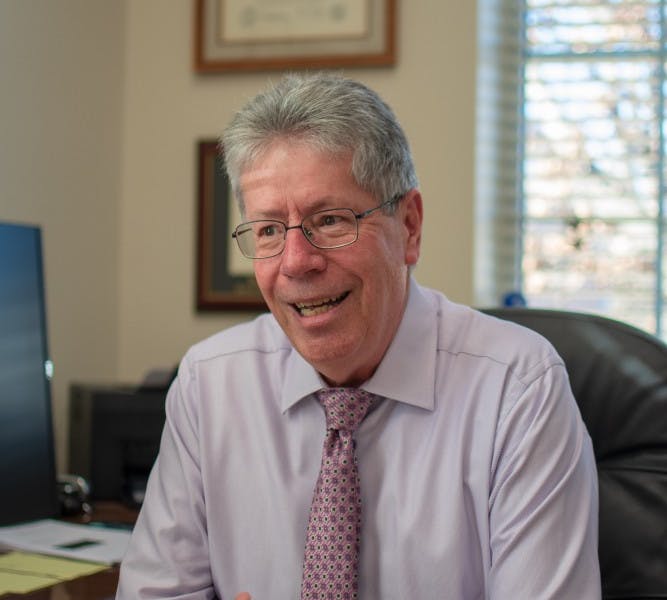From a tall, well-lit office in City Hall, the man who runs the city of Auburn works.
His door is across the hall from the office of the mayor. He serves for an indefinite term and is not directly elected by the people of Auburn. In fact, many citizens probably do not know his name.
Jim Buston is the Auburn city manager, and his job title is fairly descriptive given that he manages the city.
Auburn has a council-manager form of government. This means that while the citizens of Auburn elect a city council and a mayor, those elected officials then appoint a city manager who runs the day-to-day operations of the city. Buston described it like a business.
“The city council acts as a board of directors for a corporation,” Buston said. “The board of directors set priority, and they set vision for the organization. The city manager is like a CEO of a company, and that CEO answers to the board of directors, but the CEO then is responsible for the day-to-day operation of the organization.”
While many citizens may have concerns about an unelected person making the daily decisions for the community, council-manager governments are intended to be less corrupt than their predecessors.
Buston referenced how some politicians in “the old days” may have used their elected positions to give kickbacks to their friends and family. He called it “the good-ole-boy network.”
“The whole reason for the council-manager form of government is to be a more transparent, less political organization,” Buston said.
Citizens may also be concerned that the person making decisions does not answer directly to the people.
“I think some people misunderstand that just because an elected [official] is not making the day-to-day decisions, doesn’t mean that elected [official] has no political authority or power,” Buston said. “Where all the power is, is in the money — is in the budget, and [the City Council] control(s) that.”
There are also checks and balances that apply to Buston’s position. Even though he cannot be voted out by the general population, the City Council can remove him from office whenever they see fit, according to the city code.
“I’m not saying [corruption] can’t happen in a council-manager form of government,” Buston said. “But it is much, much harder.”
Buston’s career has wound through both the public and private spheres.
He attended undergraduate school at Oregon State University and intended to become a marine biologist. After having second thoughts, Buston joined the Peace Corps for two years.
After that, he was asked to serve as the civilian technical advisor to the government of Honduras, a position he held for three years. This is the point in his life Buston said he “started to see into the profession of managing in a government organization.”
Buston moved on to Auburn’s graduate school, graduated and began working for a small software start-up company. That company was eventually sold.
Then, 22 years ago, the city manager of Auburn at that time asked Buston to form an IT department for the city. Buston agreed and ran the organization for three years.
Twelve years ago, he was hired as the assistant city manager, and in 2017, he became Auburn’s city manager.
Now, as a man with considerable power over government functions in Auburn, Buston’s opinions on certain issues are worth considering.
Perhaps the most well-known issue in Auburn has been the height of buildings downtown. This was brought up when developers began proposing high-rise block apartments like West & Wright, 191 College and The Standard at Auburn. For many citizens, this was a debate about raising the height limit from 65 feet to 75 feet.
Buston disagrees.
“It really wasn’t about building height,” he said. “It was more about buildings that had the aesthetic to fit into the environment, and building height was easier to grab onto as an issue.”
He made his point by saying that of those three buildings, only two are 75 feet tall; one is still only 65 feet tall.
“You can’t tell which one,” Buston said.
The other issue that many Auburn residents are becoming aware of is the zoning problem in Ward 1. Since it is a historically residential and African-American part of town, many in the city are resistant to developers building apartments there.
Buston said that the city government set up zoning restrictions, which would require single-family detached houses. The intention was to prevent developers from building duplexes and apartments, but some developers have found a loophole.
“They build a single house but put five bedrooms and five bathrooms inside,” Buston said. “So, it looks like a single-family detached, but it is basically a student dorm.”
The city has started calling these five-bed-five-bath houses “academic detached dwelling units.”
Some people in the Auburn community have suggested that some of the citizens selling their property in this district are being cheated, that the developers are taking advantage of them. Buston responded by saying “that is a real discredit” to the people selling their property.
“To me, it is a slap in the face to the people in that neighborhood,” Buston said. “There are some people that may not have understood, but I think you don’t discount a person’s intelligence just because of where they live or their economic status.”
Buston then turned to the issue of homelessness in Auburn.
“We don’t have a good idea of what our homeless population is,” Buston said. “If [a city] has a homeless population, you want to get ahead of it before it becomes a crisis.”
Do you like this story? The Plainsman doesn't accept money from tuition or student fees, and we don't charge a subscription fee. But you can donate to support The Plainsman.





